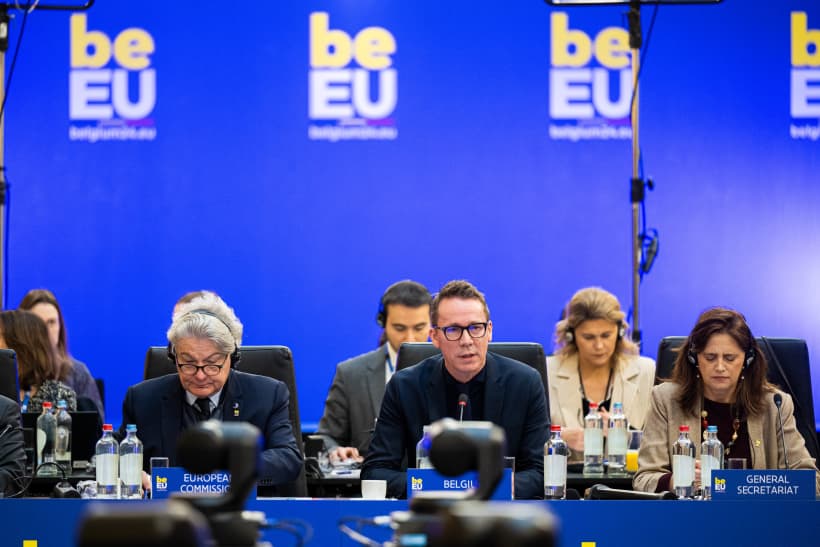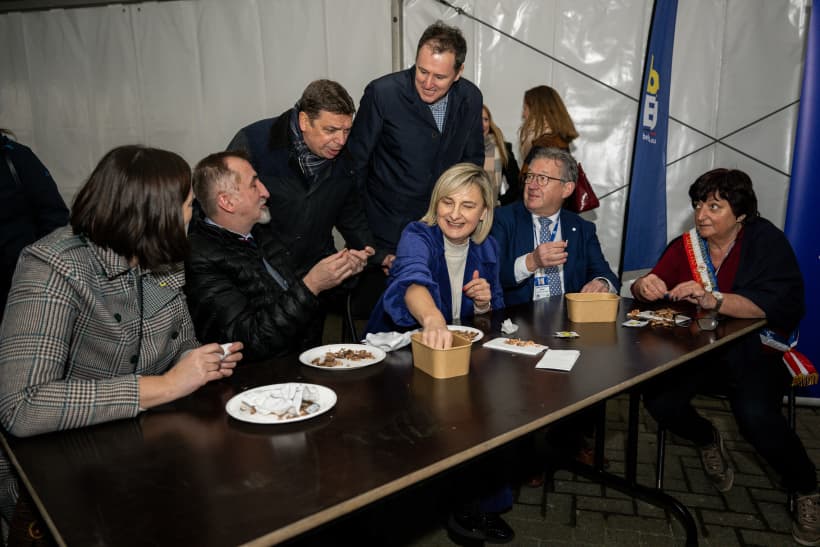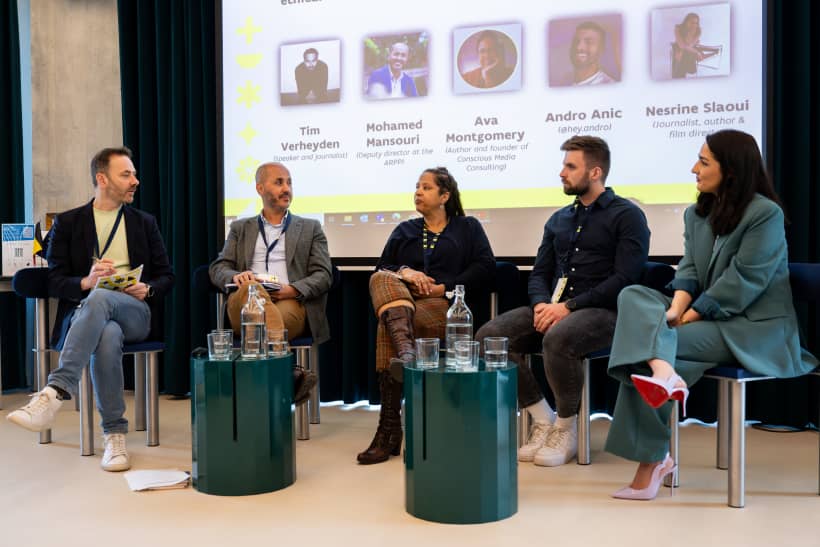Flanders and the EU presidency: a recap
On 30 June 2024, Belgium concluded its six-month term of the presidency of the Council of the European Union. Now that the presidency has come to an end, it is time to look back on the results achieved. The Belgian presidency has made an overview(opens in new window) of its legislative and political achievements over the past six months. Flanders also played an important role in this, representing Belgium as president for matters relating to Industry, Youth, Culture, Media and Fisheries.
Under Flanders’ impetus, some trilogues could be concluded, or important agreements sealed, such as the Net-Zero Industry Act, the European Media Freedom Act and the Common Agricultural Policy revision. With the adoption of a series of presidency conclusions, Flanders also sought to set the agenda for the EU’s new institutional cycle: on the future of EU industrial and agricultural policy, support for influencers, the use of data in the cultural and creative sectors, and inclusive societies for young people.
Strengthening, digitalising and greening European industry

Strengthening European competitiveness was one of the priorities of the Belgian presidency and one of the main focuses put forward by the Government of Flanders. Flanders actively promoted smart competitiveness in order to strengthen European growth and prosperity.
The competent Flemish Minister for Economy, Innovation, Work, Social Economy and Agriculture formally chaired the Industry Council. Together with the federal economy minister, he welcomed the other European ministers to the informal Competitiveness Council in Genk on 8 and 9 February 2024, to reflect on the future of European industry and the internal market. The output from that informal Council was taken into account in the Council conclusions that reveal the interests and sticking points in terms of (future) industrial policy, such as the importance of innovation for and by industry and sufficient funding.
Flanders also set the agenda in the field of research by actively contributing to the council conclusions on the development of the next framework programme for research and innovation, for which negotiations will start in late 2025.
To achieve the EU’s economic and environmental goals, Flanders advocated investments in green technologies and an accelerated digital transformation of society as a whole. As such, the green and digital transitions are intrinsically linked.
During the first half of the presidency, Flanders efficiently managed the trilogues of the European Regulation for a Net-Zero Industry. Within the framework of the European Green Deal, the Net-Zero Industry Act (NZIA) is to create a framework for EU companies to invest more quickly and easily in net-zero manufacturing projects.
In terms of green transition, Flanders also focused on sustainable mobility through the presidency. On 30 January 2024, the High-Level EU Cycling Conference took place in Hasselt at the initiative of the Flemish Minister for Mobility and Public Works. This conference led to a European Declaration on Cycling that will guide future cycling policy in Europe.
In pursuit of a more sustainable transport policy, Flanders took the lead in the final agreement on the new Trans-European Transport Network (TEN-T): a crucial element in providing the infrastructure needed for a modal shift and seamless connectivity in the EU.
Furthermore, the Belgian presidency concluded important agreements with the European Parliament to protect the environment and climate. Again, Flanders played a key role therein. For example, the Flemish public administration was in charge of revising the Air Quality Directive(opens in new window).
A two-day conference on tackling PFAS pollution also took place in Antwerp on 1 and 2 February, where the new Knowledge Centre for Innovative Remediation Solutions (KIS) was launched as well.
By organising a European Water Conference(opens in new window), Flanders in its turn made an important contribution to making Europe more resilient to the challenges of the water crisis. The conference focused on the need for European measures for efficient water management and a coherent European policy on water scarcity and drought.
Finally, important steps were taken during the presidency in terms of the circular economy. The European Circular Economy Forum(opens in new window) was an interactive and inspiring platform for sharing knowledge and experiences on circular initiatives and practices, both in Belgium and beyond. Alongside climate adaptation, the circular economy was therefore an important theme put forward by Flanders in the Council conclusions on future European environmental policy as guidance for the next European Commission.
During the presidency, Flanders also took up its international leadership role in the area of digital transition. It is important for Europe to shape its digital future amid global competition. That was the focus of the event ‘Research to Reality - Digital Solutions to European Challenges(opens in new window)’ that took place on 5 and 6 February 2024.
One of the themes that was high on the agenda was data-driven audience development in the cultural and creative sectors. At a conference in Ghent on 8 February 2024, national and European policymakers and actors from the cultural sector were invited to sign the Ghent Manifesto: a declaration of intent for structural collaboration to strengthen data-driven audience development in the cultural and creative sectors. The topic was also included in the Council conclusions(opens in new window).
Sustainable agriculture and fisheries

Prompted in part by farmers’ protests across Europe, a more equitable transition in the agricultural sector was one of the key topics during the presidency. In the informal Agriculture Council and during several conferences and Council working groups, Flanders worked hard on the Council conclusions(opens in new window) on the future of agriculture in the EU - more specifically on the strategic role of the agricultural sector with regard to ensuring food security and strategic autonomy in an open economy. The pivotal role of research and innovation was recognised, and simplification to reduce the administrative burden, support for young farmers and resilience to climate change are priorities in the coming years.
At the Open Food Conference(opens in new window) in March 2024 in Leuven, the focus was on making food production and consumption economically, socially and environmentally sustainable.
The Fisheries ministers worked on the transposition and preparation of new measures and regulations. To that end, the Flemish Minister for Welfare, Public Health and Family, responsible for Fisheries, invited her European peers to an informal Council in Bruges and Zeebrugge on 24 and 25 March 2024.
Democratic values
Defending fundamental democratic principles was one of the key priorities of the Belgian presidency.
European Media Freedom Act
The final agreement on the European Media Freedom Act (EMFA) was an important step to help safeguard press freedom. The EMFA creates a common framework for media services. The Act responds to growing concerns in the EU about political interference in the media and the lack of transparency of media ownership. As chair of the Media Council, Flanders led the Council’s preliminary negotiations with the European Parliament and the European Commission. On 11 April 2024, the EMFA was officially signed by the Flemish Minister for Brussels, Youth, Media and Poverty Reduction at a ceremony in the European Parliament.

The Media presidency organised the ‘Content with Conscience’ conference on 27 February 2024. Experts and European influencers shed light on media and digital literacy and responsible behaviour among influencers, a theme that was also entered in Council conclusions(opens in new window).
Social inclusion and youth participation
Flanders also assumed the presidency for Youth matters . Under the slogan ‘EU NEEDS YOUTH - Connecting young minds to empower Europe.’, four Council acts were adopted, based on direct input from young people and the youth sector.
The March 2024 EU Youth Conference in Ghent led to Council conclusions on inclusive societies for young people, as part of the tenth cycle of the EU Youth Dialogue(opens in new window). The conclusions(opens in new window) point out the importance of social inclusion and equality and emphasise healthy and liveable neighbourhoods for young people.
One of the key goals of the Youth presidency was to promote youth mainstreaming in all relevant EU policy areas. The Council conclusions(opens in new window) therefore advocate stronger links between youth and children’s rights policies. The Council conclusions(opens in new window) on the legacy of the European Year of Youth 2022 also propose an EU youth check as an important tool. Finally, a Council Resolution(opens in new window) was also adopted that emphasises the importance of equal access to youth work, including the necessary education, training, resources for youth workers and new forms of voluntary and civic engagement.
The presidency also focused on strengthening the European Education Area by adopting the Council conclusions(opens in new window) on promoting evidence-informed policy and practice in education and training and the Council Recommendation(opens in new window) ‘Europe on the Move - learning mobility opportunities for everyone’.
A social and healthy Europe
Strengthening the resilience and inclusion of all EU citizens also includes measures framed within the social and health agenda. These measures are to ensure that all European citizens can share in Europe’s prosperity.
Flanders provided significant input into the Council conclusions on the Future of the European Health Union(opens in new window) by contributing expertise in antimicrobial resistance and cancer prevention through vaccination. A European Conference on Health Data Space also took place in Leuven on 2 and 3 May 2024. The participants discussed how data can be used to integrate healthcare systems and strengthen local communities.
To analyse how the social economy can best fulfil its role in the transition to a green, digital and inclusive economy, the presidency organised a large-scale expert meeting and a ministerial conference. At the conference, the European ministers approved the ‘Liège Roadmap’ with 25 commitments to boost Europe’s social economy.
Flanders in the spotlight in Europe
Besides its formal role, the EU presidency also proved an excellent opportunity to put Flanders in the spotlight within the EU. The participants of the more than 100 events got to know Flanders as a ‘state-of-the-art’ region through its assets, not only in the areas of technology and innovation but also in the domains of arts and culture, science, research, education and gastronomy.
Finally, the Government of Flanders wanted to use the EU presidency to increasingly animate the EU debate in Flemish society by making clear what Europe means to the citizens of Flanders and what the people of Flanders mean to Europe.
The grand opening event in Mechelen on 6 January 2024 and the six-month public campaign (in Dutch) brought Europe a little closer to the citizens of Flanders. Take a look at the hero stories(opens in new window) specially cast in videos for the public campaign.
If you are curious to see the full list of events organised by the Flemish public administration during the EU presidency, take a look at flanders.be/eu2024.